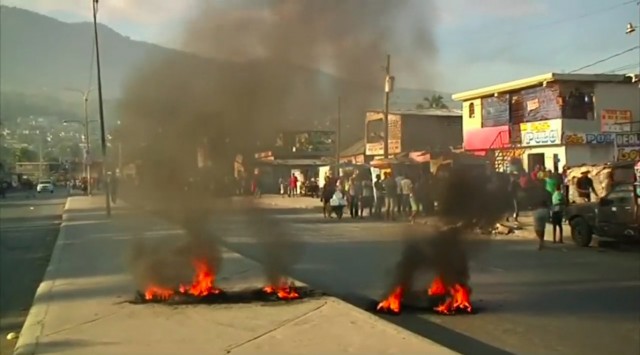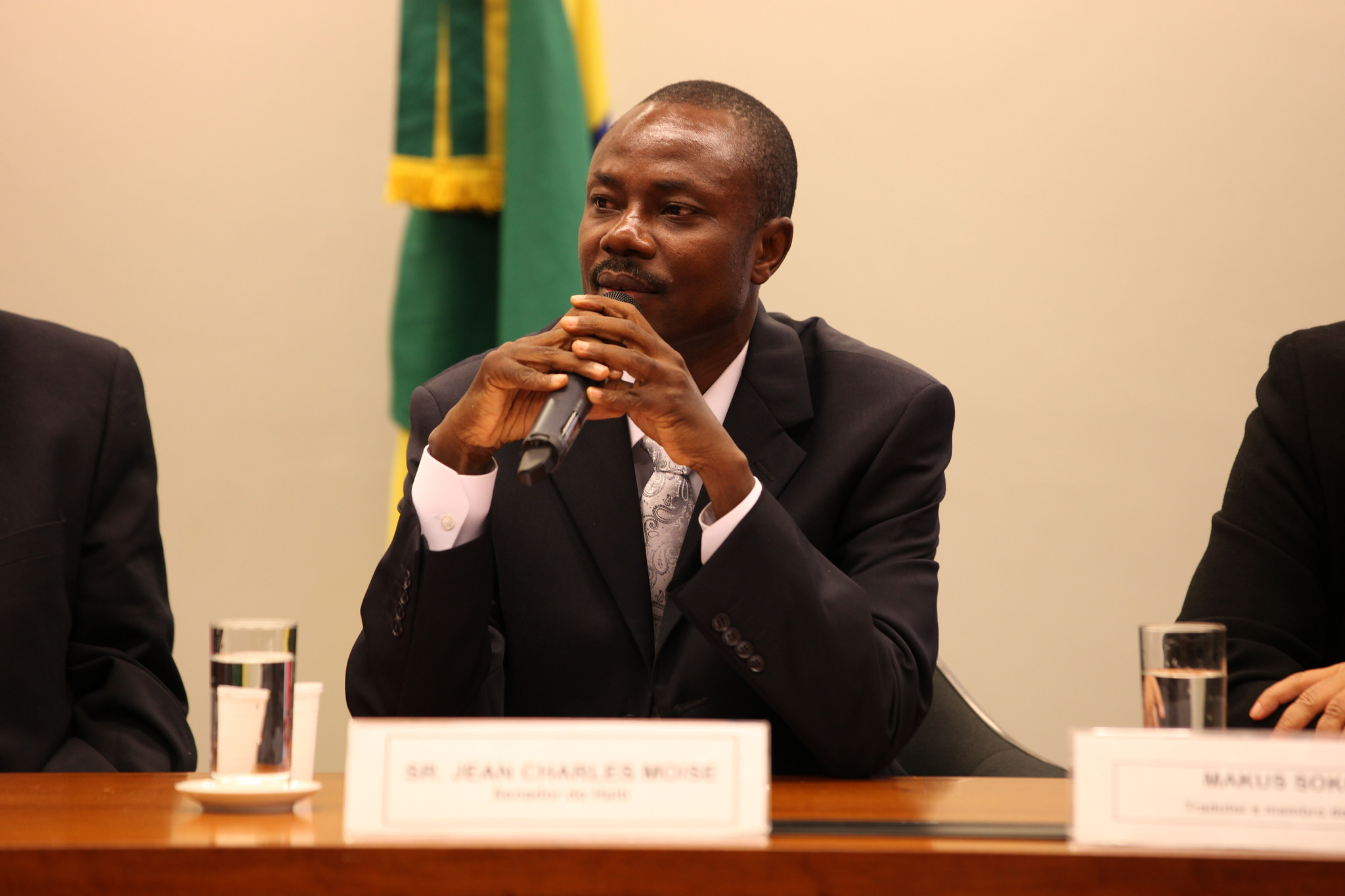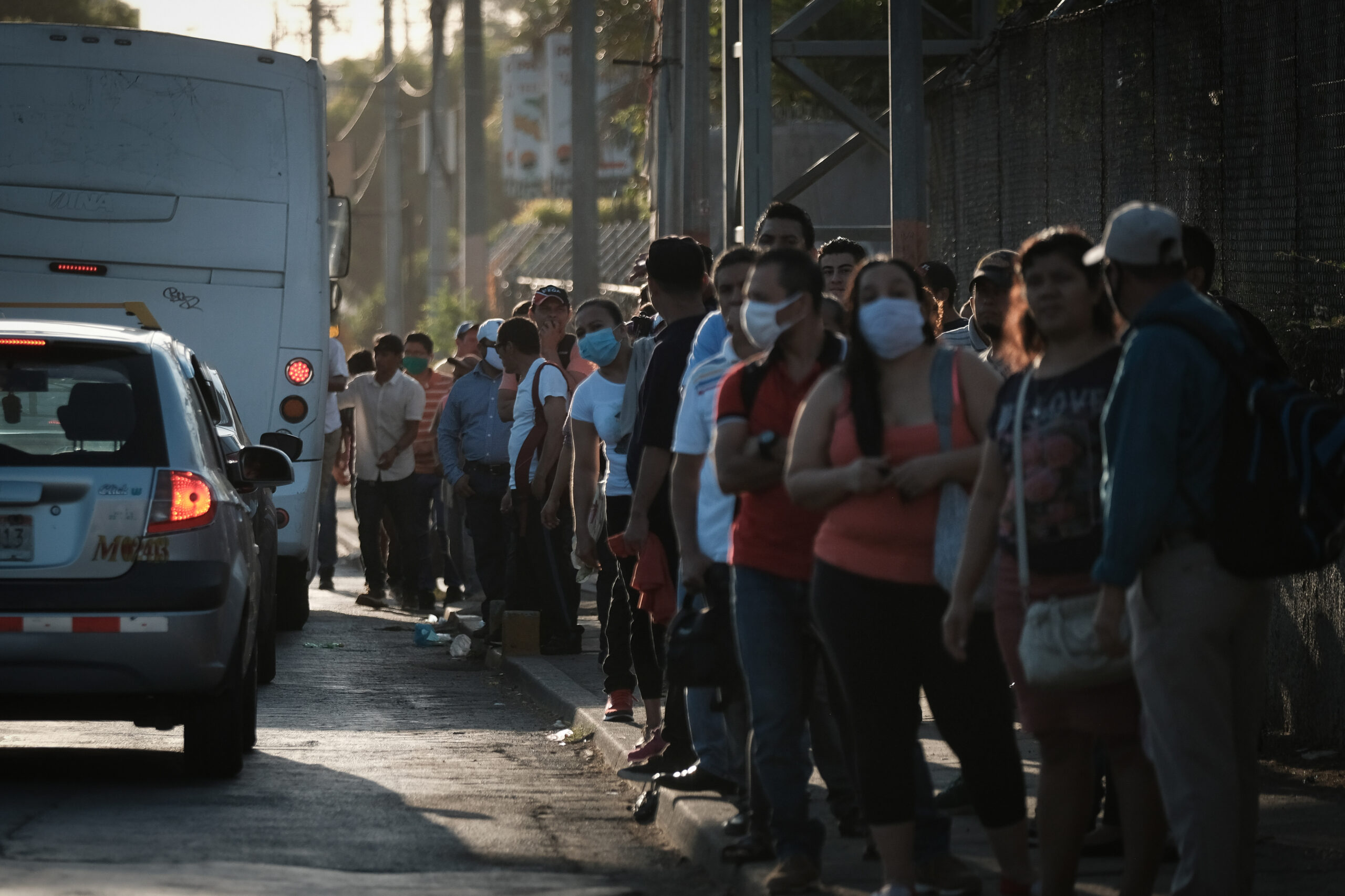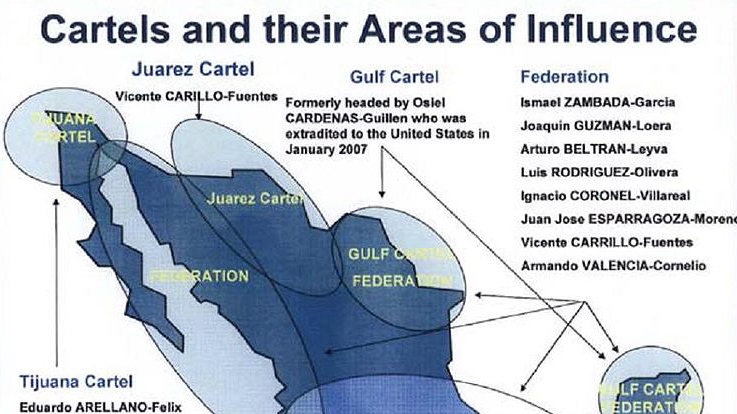
Features, Haiti
Haiti’s New York Spokesman; A Profile of Activist Ray Laforest
March 12, 2010 By Andrew OReilly
NEW YORK — When Ray Laforest walked into his office at the American Federation of State, County and Municipal Employees (AFSCME) in lower Manhattan on January 12, he immediately sensed that something was wrong.
The normal frenzied energy of the office was replaced by people crowded around televisions and speaking in hushed voices. As he walked into his meeting someone asked Ray, a Haitian immigrant, a question that took him by surprise.
“Did you hear what happened in Haiti?” one of his coworkers asked.
“No,” he replied.
“There was a major earthquake in Port-au-Prince,” the coworker said.
Ray immediately left the meeting and went to one of the televisions where his coworkers were watching CNN. It was there that he saw the first images coming out of the shattered Haitian capital.
After watching in disbelief for a few minutes, Ray went back to his office and called friends at the newspaper Haiti Liberté, a publication that follows Haitian news.
After speaking with the New York-based newspaper, he tried calling family members in Haiti, but was unable to speak with anyone. “It was very worrisome because we couldn’t get in touch with friends or family,” Ray said, “We couldn’t get in touch with anybody.”
The earthquake was a devastating setback for the poorest country in the Western Hemisphere. Haiti is plagued by poor infrastructure, a weak government, poor city planning and widespread poverty. Ray has devoted much of life to improving conditions in his homeland.
François Joseph Raynald Laforest was born in Port-au-Prince, Haiti in 1947 into what, by no means, most people would consider a typical Haitian childhood. “I came from a very comfortable background… very stable,” Ray said. He grew up in a Catholic, mulatto, Port-au-Prince household where his father worked as a doctor and was a former cabinet minister, his family was waited on by eight servants and who would vacation at their beach house to escape the city.
But from a young age Ray began to see the disparity that existed in Haiti under the rule of dictator François “Papa Doc” Duvalier, who led the country from 1957 until 1971. “When I was ten years old fascism came to Haiti,” Ray said. “My nice world came to an end during the election of Papa Doc.”
He remembers nights when he tried to fall asleep to the sounds of gunfire on the streets and hearing hushed voices talk of people the government disappeared because they criticized Papa Doc’s tactics.
Ray noticed at a young age Haiti’s social problems and the murders, torture and disappearances committed by the Papa Doc regime.
By the age of 12, Ray had joined a youth organization run by Catholic priests, opposed to Papa Doc. It was this organization run by “people of action” that got Ray his start in the world of activism.
From the youth organization Ray, along with his brother Gerard, were asked to join Haiti Progress, a clandestine group that styled itself after Fidel Castro’s Cuban Revolution and was comprised of a similar group of wealthy, progressive intellectuals with varying socialist leanings. “We thought to redo Haiti; we must overthrow the fascist system,” Ray said.
Haiti Progress’ main goals were to provide jobs, better pay and agrarian reform to the poor of Haiti. The group worked through clandestine, urban warfare as well as the spread of their leftwing ideologies. The group’s members took pride that they undermined Papa Doc’s dictatorship, even though they could not accomplish many of their goals.
Ray also proved to be a popular, charismatic figure in Haiti Progress who rose quickly through the ranks. He commanded his own cell, was known for his skill with firearms, as and for being one of the group’s most eloquent speakers.
But Ray’s charisma also brought him to the attention of Papa Doc’s administration. After a failed attack on the Haitian Army near the border with the Dominican Republic, leaders in Haiti Progress decided that Ray should flee to the United States. “It was getting harder to justify my presence in Haiti,” Ray said.
In 1967, Ray moved to New York City to rally support for the movement in the United States. He left just in time. Three months after he arrived in New York, a Haiti Progress safe house was raided and those found inside were arrested, tortured and ultimately executed.
“The goal was to create a support network within the Haitian community,” Ray said, “Unlike in Haiti, we could have public meetings and do organizing openly.”
He began printing flyers and pamphlets as well as helping organize radio shows for Haitians that could not read. Along with his burgeoning career as a Haitian activist, Ray got a job doing clerical work at Queens Hospital Center and earned a master’s degree from Queens College in social work.
But clerical work did not fulfill Ray the way that his activism did. By the mid-1980s, Ray began looking for work where he could pursue his activism fulltime.
Finally, in November of 1992 a friend found him a job at AFSCME, where he is now the director of organizing at the union. “It was great because before I had to do politics on the weekends, now I can do politics on the weekdays too,” Ray said.
Aside from his involvement in the Haitian community and a full-time job at AFSCME, Ray also worked at WBAI FM, a progressive radio station in New York, where for a time he was on the station’s local board and is still a frequent guest.
Ray is now 63 years old, a bit pudgy with salt and pepper hair and chinstrap beard, but he seems much younger. Normally dressed in what appears to be his uniform of brown sneakers, khaki pants, an oxford shirt with stripes in seemingly every color of the crayon box and a sweater-vest right out of Bill Cosby’s closet, Ray exudes energy when speaking about his work or passions.
“That’s my style. In a project I’m more focused and more intense,” Ray said.
Ray’s tireless work ethic and passion for the projects he works on can at times be his great flaw, said Kim Ives, an editor at Haiti Liberté who is a longtime friend of Ray. “He is a very caring person; diplomatic, tireless in terms of his work for social change,” Ives said, adding, “He sometimes has no break when he needs to regroup and rest, because he sometimes drives himself to exhaustion. ”
His diversity of interests may lead to the point of exhaustion, but it allows for him to communicate with a wide variety of people.
“What is most impressive about Ray is how active he is, not just in regards to the Haitian community but in a variety of movements,” said Jeff Olshansky, an activist in the labor movement and law student, who has worked with Ray at a number of panels.
Nearly two months after the earthquake in Haiti, Ray still can’t rest. With approximately 156,000 documented Haitian immigrants in New York City according to the United States Immigration and Naturalization Services (INS), Ray’s purpose in the rebuilding of Haiti is to drum-up support for the country and keep Haiti on people’s minds.
“He has helped people understand that this catastrophe is not just made by Mother Nature,” Ives said.
Other countries that faced similar devastation, as Germany in World War II, had systems in place and the know-how to rebuild. But Ray said that Haiti did not have these things and this is main reason for the massive devastation. “Haiti has been denied that,” Ray added.
There should be a more multilateral approach to rebuilding Haiti — not just a United States relief effort — and the Haitian people should take a more active role the process, according to Ray. “This is not supposed to be an occupation,” Ray said. “It would be better to use more structures within the Haitian government to distribute aid.”
“There is a tremendously difficult future ahead for Haiti,” Ray said. “I don’t think any country has had to face something like this.”







1 Comment
Muy buen escrito , vuestra pagina web ira a mis favoritos . gracias
Comments are closed.